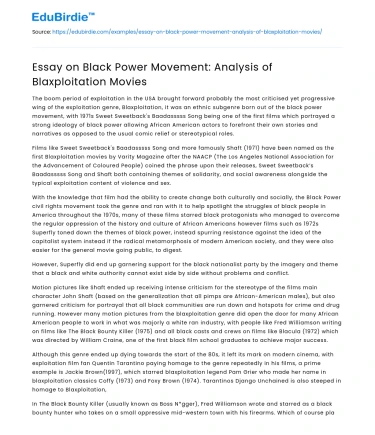Introduction
The Black Power Movement of the 1960s and 1970s was a pivotal period in American history, characterized by a robust assertion of African American identity, cultural pride, and political strength. One of the most intriguing cultural phenomena that emerged during this era was the Blaxploitation film genre. These films, produced primarily in the United States, were unique in their portrayal of African American protagonists and often depicted themes of empowerment, resistance, and defiance against systemic oppression. While Blaxploitation films were initially celebrated for providing a platform for black actors and filmmakers, they also sparked considerable debate regarding their societal impact and portrayal of African American life. This essay will analyze the relationship between the Black Power Movement and Blaxploitation films, examining how these movies both supported and undermined the movement's goals. Through specific examples and critical perspectives, we will explore the dual-edged nature of Blaxploitation cinema and its legacy within the broader context of African American cultural history.
Blaxploitation as Cultural Empowerment
Blaxploitation films emerged in the late 1960s as a response to the African American community's demand for representation and empowerment in the media. Films such as "Sweet Sweetback's Baadasssss Song" (1971) and "Shaft" (1971) introduced audiences to strong, assertive black protagonists who defied the traditional cinematic stereotypes of African Americans as subservient or comedic characters. Melvin Van Peebles, the director of "Sweet Sweetback's Baadasssss Song," famously stated that his film was a revolutionary act intended to portray African Americans in a position of power and autonomy. In this sense, Blaxploitation films aligned with the Black Power Movement's emphasis on self-determination and pride.
Save your time!
We can take care of your essay
- Proper editing and formatting
- Free revision, title page, and bibliography
- Flexible prices and money-back guarantee
Moreover, these films played a significant role in shaping African American cultural identity by embracing elements of black culture that had been marginalized in mainstream media. The soundtracks of Blaxploitation films, often composed by iconic artists like Curtis Mayfield and Isaac Hayes, infused funk and soul music into the cinematic experience, further cementing the genre's cultural significance. According to scholar Ed Guerrero, the genre "represented a cultural assertion of blackness and a reclamation of black history and identity." By providing a platform for black talent both in front of and behind the camera, Blaxploitation films contributed to a burgeoning sense of cultural empowerment among African Americans.
The Critique: Stereotypes and Commercialization
Despite their contributions to cultural empowerment, Blaxploitation films were not without their critics. Some argued that these films perpetuated negative stereotypes and exploited African American culture for commercial gain. The term "Blaxploitation" itself reflects a critique that these films commodified black experiences for predominantly white audiences, often relying on sensationalized portrayals of violence, sex, and crime. Critics like Angela Davis and bell hooks have pointed out that while these films offered visibility, they frequently depicted African Americans in roles that reinforced societal prejudices.
The commercialization of the Blaxploitation genre also raised concerns about the extent to which these films truly supported the Black Power Movement. As Hollywood recognized the profitability of Blaxploitation, the genre's focus shifted from authentic cultural expression to formulaic plots designed to maximize box office returns. This shift led to a dilution of the genre's original intent, as films became more about spectacle than substance. The film "Super Fly" (1972), for example, faced criticism for glamorizing drug dealing and criminal behavior, thus undermining the movement's goals of promoting positive and constructive images of African Americans.
Legacy and Impact on Modern Cinema
The legacy of Blaxploitation films is complex and multifaceted. While they were a product of a specific historical moment, their influence can be seen in contemporary cinema and popular culture. Modern filmmakers such as Spike Lee and Quentin Tarantino have drawn inspiration from Blaxploitation, integrating its stylistic elements and themes into their work. Films like "Black Panther" (2018) and "Django Unchained" (2012) reflect the enduring appeal of the genre's focus on black empowerment and resistance.
However, the legacy of Blaxploitation is not without controversy. Some argue that the genre's stereotypical portrayals continue to affect the representation of African Americans in media today. As scholar Yvonne D. Sims notes, "The residue of Blaxploitation’s problematic imagery lingers in contemporary portrayals of black life." Yet, it is essential to acknowledge that Blaxploitation films also paved the way for greater diversity in Hollywood, challenging the industry's norms and opening doors for future generations of African American artists and storytellers.
Conclusion
In conclusion, the Blaxploitation film genre represents a significant and ambivalent chapter in the history of African American cinema and the Black Power Movement. While these films offered a platform for cultural empowerment and visibility, they also faced criticism for perpetuating negative stereotypes and succumbing to commercialization. The dual legacy of Blaxploitation reflects both its achievements and its shortcomings, highlighting the ongoing struggle for authentic and diverse representation in media. As we continue to examine the cultural and historical significance of Blaxploitation films, it is crucial to balance their contributions against their limitations, understanding them as both a product and a critique of their time. Ultimately, the analysis of Blaxploitation within the context of the Black Power Movement underscores the complexity of cultural representation and the enduring quest for equality and empowerment in the arts.






 Stuck on your essay?
Stuck on your essay?

